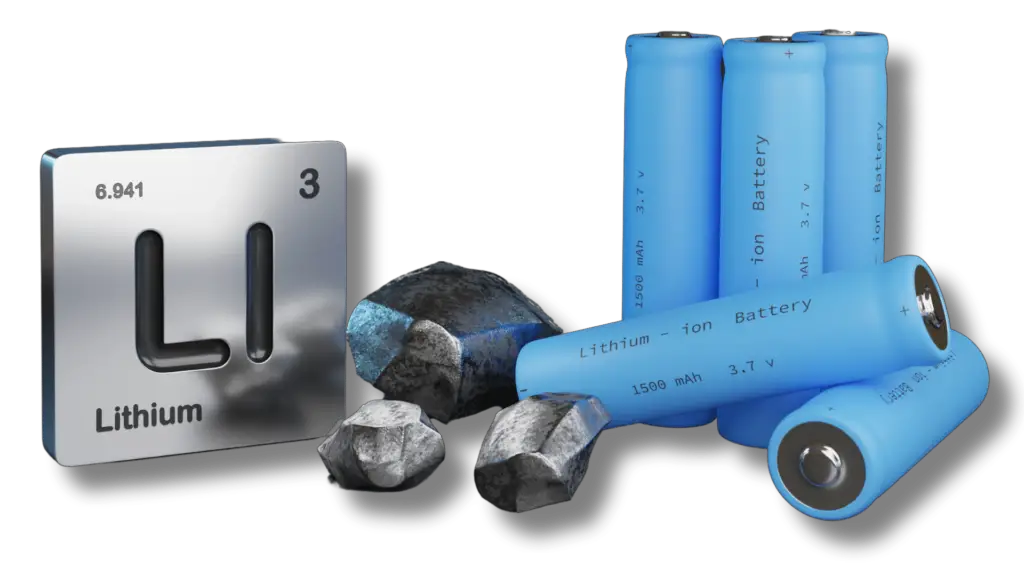Due to their high energy density, low weight, and capacity for providing continuous power output, lithium-ion batteries have emerged as the preferred power storage option for electric vehicles (EVs). Nevertheless, not all lithium-ion batteries are the same, and different battery types offer different combinations of energy density, power output, lifetime, and safety.
To effectively weigh the trade-offs between driving range, safety, and cost, it is critical to comprehend the numerous lithium-ion batteries utilized in electric vehicles. This article will provide a broad overview of the most common lithium-ion battery types used in electric vehicles and details on how they differ.
Lithium-Ion Batteries Used In Electric Vehicles

Electric cars employ a variety of lithium-ion battery types, such as lithium iron phosphate (LiFePO4), lithium nickel manganese cobalt oxide (NMC), lithium cobalt oxide (LCO), and lithium titanate oxide (LTO). LiFePO4 batteries are a popular option for EVs because of their stability, safety, and extended lifespan. NMC batteries are ideal for extended driving ranges because of their high energy density and power output.
LCO batteries are less dependable and have a shorter lifespan while having a higher energy density than other types. LTO batteries offer a lower energy density but a longer lifespan, quicker charging times, and excellent performance in harsh temperatures. The choice of battery type is influenced by price, driving range, and safety. New battery technology development may continue to widen the options accessible to electric car makers.
Lithium Iron Phosphate (LiFePO4)
Due to their safety, stability, and longer lifespan compared to other lithium-ion battery types, lithium iron phosphate (LiFePO4) batteries are preferred for electric cars. Because LiFePO4 batteries have a lower energy density than other lithium-ion batteries, they have a lower power output and a shorter driving range. Nonetheless, they are safer since they provide more stability and are less prone to overheat.
Because they include less harmful elements, LiFePO4 batteries also last longer and are better for the environment. Although having a lower energy density, LiFePO4 batteries are a popular option for electric vehicles (EVs) that put lifespan and safety before maximum driving range.
Lithium Nickel Manganese Cobalt Oxide (NMC)
Since they have a higher energy density, more power, and a longer lifespan than other battery types, lithium nickel manganese cobalt oxide (NMC) batteries are another common form of lithium-ion battery used in electric cars. Nickel, manganese, and cobalt are the main ingredients of NMC batteries, which balance high energy density with high power output.
Compared to LiFePO4 batteries, NMC batteries can longer drive distances and quicker charging. They are less stable and more likely to overheat, which raises questions about their safety.
Notwithstanding the potential safety hazards, NMC batteries remain a preferred option for EVs that put performance and driving range before lifespan and safety.
Lithium Cobalt Oxide (LCO)
Due to its high energy density and power output, lithium cobalt oxide (LCO) batteries are lithium-ion batteries used in electric cars. LCO batteries can offer a more excellent driving range than LiFePO4 batteries because they have a higher energy density.
Nevertheless, due to their weaker stability and increased danger of overheating, LCO batteries have a shorter lifespan than other lithium-ion batteries.
In addition to costing more, LCO batteries have a higher concentration of cobalt, a costly and rare metal. Due to their high energy density and power output, LCO batteries are regularly used in high-performance electric vehicles. Still, due to their short lifespan and greater cost, they may not be used as frequently as they may be.
Lithium Titanate Oxide (LTO)
Because of their longer lifespan, quicker charging periods, and greater performance at high temperatures, lithium titanate oxide (LTO) batteries are utilized in electric vehicles. Compared to other lithium-ion batteries, LTO batteries have a lower energy density, resulting in lower power output and a shorter driving range.
LTO batteries, on the other hand, are better suited for high-use applications like electric cars since they can be charged more quickly and survive more charge cycles. LTO batteries are a more reliable alternative for EVs in inclement weather because they improve performance in various temperatures.LTO batteries are still popular for EVs that value lifespan, dependability, and quick charging times above the maximum driving range despite having a lower energy density.
Lithium Manganese Oxide (LMO)
Because of their stability, safety, and affordability, lithium manganese oxide (LMO) batteries are one type of lithium-ion battery used in electric cars. The energy density of LMO batteries is lower than that of other lithium-ion battery types, which results in lower power output and a shorter driving range.
On the other hand, LMO batteries are recognized for their superior stability and safety, which reduces the risk of overheating and fire.
In addition to being less expensive than different types of lithium-ion batteries, LMO batteries are a standard option for EVs that place a premium on cost-effectiveness.
LMO batteries with a lower energy density are frequently used in smaller electric vehicles, including scooters and electric cycles, where safety and price are more crucial than a maximum driving range.
Conclusion
To sum up, several distinct types of lithium-ion batteries are used in electric automobiles, each with unique features and advantages. Lithium iron phosphate (LiFePO4) batteries are renowned for their durability, reliability, and stability. Longer driving distances are possible with lithium nickel manganese cobalt oxide (NMC) batteries thanks to their high energy density and power output.
Lithium cobalt oxide (LCO) batteries have a high energy density but are less reliable and last for a shorter period. Lithium titanate oxide (LTO) batteries have a lower energy density but a longer lifespan, quicker charging times, and superior performance at high temperatures. Lithium manganese oxide (LMO) batteries are renowned for their stability, safety, and affordability. Lastly, Lithium Nickel Cobalt Aluminum Oxide (NCA) batteries are more costly and less stable than other varieties but have a high energy density and power output.
The choice of battery depends on several factors, such as cost, driving range, safety, and performance. As battery technology advances, producers of electric vehicles will likely have more alternatives in the future.